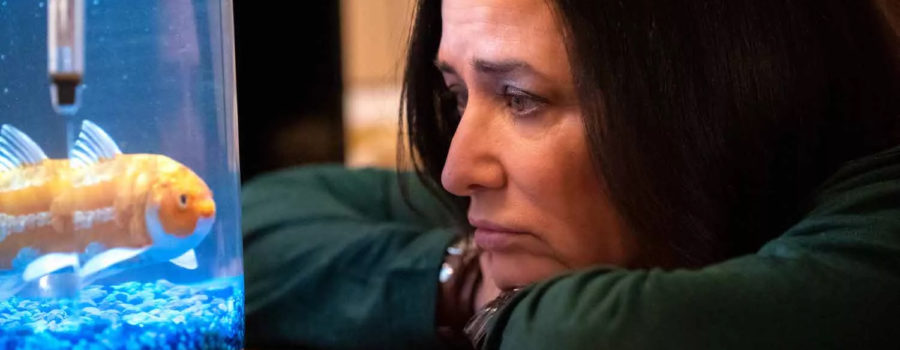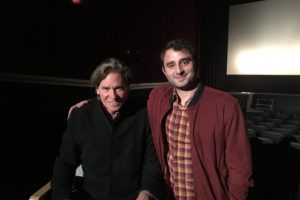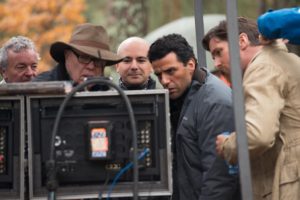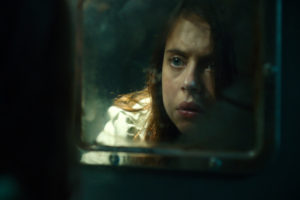[Published at Slant Magazine] Pamela Adlon’s Better Things unflinchingly mirrors the actress’s stealthily spiritual personal life. The FX series, which premiered in 2016, is a sterling demystification of the glitz and glamour of Hollywood, as well as provides an unprecedented glimpse into the everyday life of a working actor and mother.
Better Things began as a dramedy with hints of supernatural elements and has arguably evolved into a quasi-ghost story about growing up for a family of “witches,” as Celia Imrie’s Phil proclaims at one point. And across the show’s final season, during which Adlon’s Sam Fox continues to struggle to keep her biological and chosen family of soulful optimists together, the ghosts of past mistakes and spirits of new relationships pave the way for a future untold.
On the eve of Better Things’s finale, I spoke to Adlon about the initial pitch for the series, the evolution of her TV stand-in children, and the supernatural sinew that holds it all together.
My godmother got me into Better Things, and we both love it. After each episode we’d reconvene and discuss our theories.
Oh, that’s so nice! You guys would have a little book club for my show!
Yes! What was your initial pitch to the studios for Better Things?
For me, I didn’t see anybody who was like a normal mom on TV that I could relate to. And when I started my life as a mom, I felt intimidated, and I wanted to connect with other moms. And I felt like I was living a parallel life with other moms, and they knew how to just do breakfast and lunch and take care of their families. And I don’t wear makeup and high heels. I would say that my friends and I could go in and we could rob a store or a bank, and nobody would notice because we’re so unremarkable, because we’re middle-aged women, we’re gross. We’re not viable. We’re not the whole thing, which is funny because you’re so under-the-radar and you don’t get to really have reflection on your life when you’re just in it with the kids.
That was my pitch. And I said I look at the world in a certain way. And it’s bizarre to me. At that point, I was doing Californication, and I was doing the Tinkerbell movies, and then I would come home and I’d be pulling my garbage cans in, and I’d be cooking dinner, and it’s just like, there’s no fanfare, how kind of bizarre my life was. I was seeing it like I would punch a time card. It wasn’t glamorous, my job. But one day I looked at my mom, and instead of wanting to drive my car through a brick wall because she was just saying some shit to me, I would be like, “Oh my god, you’re funny. This is funny.” And it’s actually a good formula of a way to live your life. Instead of being annoyed by everything, you got to see the humor.
It’s amazing to see more of these underrepresented stories. This season dealt with Frankie’s identity beautifully. It was always in the show, but it shifted to the forefront this season. What were some of the conversations around that storyline?
There was a lot of pressure because when I started this show, at the time, people were ascribing labels and saying you have to say what you are. At the end of season one, Max says to Sam, “Mom, Frankie’s a boy.” For me, here you have this very together, woke woman who gets blindsided. And that’s one of the things about Sam that people relate to—that she’s not on top of everything, that she’s still learning, and that she’s naïve in some ways.
I wanted Frankie to be this fluid character, and that was very important for me from the start. When I grew up, the word was tomboy. I was always very androgynous. That was who I was. I didn’t want to make Frankie one thing or another. People still confuse gender with sexuality. They still confuse it. I’m not perfect at it, but I knew from the beginning when I started the show seven years ago that I wanted that character to live in that space.
And so what a lot of people aren’t realizing is that it’s sneaky the way we did it in the show, because Frankie’s in the car and saying, “Mom, Jason is they/them.” And Sam’s like, “Oh, they are. All righty then.” We have [those sorts of] discussions [throughout the season], including when Sam has that talk with Kevin [Phan], the wonderful Kevin who plays Jay, gay Jay in this.
Yeah! he’s awesome.
He’s so good. And Sam’s like, “This breaks my heart.” And he’s like, “My parents are the ones in the closet, man.”
Speaking of sneaky, there are so many storylines and characters that are so subtle, if you blink, you can miss them down the road when you readdress them. For instance, the man that you first see when you’re dating Henry Thomas’s character, Robin, in season two appears again in season four in New Orleans.
Yes!
You run into him again. But we never get his name. He’s almost an apparition.
His name is Nobody.
And it’s a very nonchalant form of storytelling in episodic television. For instance, you Shazam your neighbor’s music from your deck in an earlier season, but you don’t tie that storyline together until the last act of the finale. There’s no stone left unturned.
That’s so cool. I love to hear that!
And then there’s the man on the steps.
Well, the man on the steps is very symbolic of where we all are, humanity wise. And he’s sitting in the middle of this city. And Sam is talking about the thing that she was saying to Frankie: “Shut up. I’m dying. I’m trying to get up the steps.” And then she’s like, “Do you know that these steps are the Stonewall of L.A.?” And he’s like, “I don’t care.” And he says, “I’m sad.” And Sam gets immediately emotional and says, “I am too.” And a lot of people are. And it’s a way to connect Sam with the guy on the Mattachine Steps and Sam with her Persian neighbor.
And here’s the thing, that’s my friend Setareh, who is not an actor, and I had her come into the studio, and I was like, “You got to come over and do this with me.” And it was so incredible. And it’s just about how we are all just one line away from each other and just acknowledging each other. And I have so many friends from so many different communities in Los Angeles that I love, and it’s just all of those things that I wanted to put into this world. And it’s just the stuff that I like, and the way I want to model certain behaviors, and I wish that other moms had shared with me. So Better Things is me sharing all that with them.
I love the motif of the three-finger gesture that you do.
It’s like “poo, poo, poo!” [holds three fingers to her mouth and pretends to spit three times]. I mean, it can be Greek, it’s Italian, it’s Jewish. It’s “malocchio!” The evil eye. You ward off—it’s a kind of keinehora. Everybody’s got their thing that they do. So I do all these superstitious things like throw the salt over my shoulder, touch the statue.
I can certainly relate to that.
You can?
Totally. I’m very superstitious. When Phil asks Duke to do the gesture on the plane when there’s turbulence and she says whatever was special about her is gone, that was incredibly powerful because the whole season she’s been trying to cope with that by vaping and drowning it out. And Phil says it’s never gone. It’s changing. This really brings us to the theme of ghosts. The supernatural was the first thing I noticed in the show, and it started subtle, but Better Things could almost be considered a ghost series.
Yes, Alex! Yeah, man! That’s so cool! I love that! Yeah, absolutely. I mean, the crazy thing is that Olivia [Edward], her father, is John Edward, the psychic medium.

Oh, wow! Okay.
Did you know that?
No. That’s amazing.
Yeah, it is. And so that was always part of Duke. Duke was always living in both realms. And so I love that. I love fantasy. I love science fiction. I believe in all of that stuff. I’ve totally passed it down to my kids. My kids are all like, “Forget it.” We’re all like, “Mom, I got grabbed my whole childhood. There was somebody behind the door.” You know what I mean? They’re ready for all realms. We’re a bunch of Buffy Vampire Slayers.
I’m positive I grew up in a haunted house. My siblings think so too. But my mom’s like, “Whatever.” But we’re determined.
She knows.
Yeah, she knows. And Phil says you’re witches. And it’s also cool how Phil says you came from the water and that’s where you return. And the last lines in the show are the radio saying exactly that.
On the Art Bell show!
I felt that tied everything together beautifully.
And also, Alex, it’s so fun to talk about the finale with somebody. Mizuko, the movie that Max goes to see in the gallery in England, Kira Dane says in Buddhism, we start to pour into the water, into the world. We’re not fully poured in until we’re six years old. And then we start slowly pouring out at 60.
Oh, yes!
There are so many of those, baby!
It’s another great motif to continue with that spiritual element. The fall of the statue, which is very much a character, a centerpiece, kind of the guardian angel of the house keeping every realm at bay, is the beginning of the end.
The talisman.
Yes. This, along with several other elements hinting toward a character death, including your kids discussing how you aren’t going to live forever. You and Phil even walked under a ladder in the second-to-last episode.
Fuck you! I can’t believe you! Oh my god, that bothers me so much! You’re the only person who ever said that. I can’t believe you! Wow.
And then, of course, you fall down the stairs right after. But when you look at everyone at dinner in those final moments and there’s a look of contentment on your face, and then you drive off, and there’s that conversation about returning to the water and you’re happy and you tell Phil you had a good run, I think that’s as close to a character death as it gets without showing one. Because at that point, if Pam dies, we’re left with the notion that her kids are well taken care of with the community that she’s provided.
Yeah. And the other part is that you see that everybody’s booed up, including Phil. And Sam, she realizes, “Oh my god, I’m fine. I really like where my life is.” And the one phone call she chooses to make is to her mom, which is so touching to me that that’s her phone call. But it’s what you said. Everybody’s ephemera. Everything is ephemera. Everybody’s ephemera.
The antique store talk.
And the Hollywood Forever Cemetery, it’s all ephemera. And Phil’s brother and the boxes she goes through. She looks back and her village is there and she knows Max and Phil are in England. And she just drives off into the meteor solar flares with her boo, her whip.
I feel like it’s a symbolic death. But she very well could return.
It’s up to anybody’s interpretation. I think that that’s why the show is so personal for people. There’s so many ways you can think about it. I know what I feel, but I learned this when I started collecting art when I was young. If somebody tells you what’s going on in the piece, you’re like, “Oh, he’s not dead. He’s sleeping.” Ruined it for me.
Yeah. Exactly! Duke arguably has the most spiritual growth from season one to season five. But when she begins vaping, she’s trying to cope with losing her abilities as well also going through the physical changes we all go through at that age.
Well, it’s kind of a full circle thing because when we started Better Things, Max was 15, and I guess Frankie was 12 and Duke was like eight. So now Duke’s a teenager. And last season, you see Duke start to turn. And with each character, we ran it over and over in the writer’s room because I wanted to have a win for everybody. So what’s a win for Duke? Duke’s gotta go through this thing. It was very shocking to me when I would get feedback about Duke and people would say something negative about her, and I’m like, “So you’ve never had a teenage girl.” [And what I mean is] a girl who just turned 13, when there’s no grace.
And people are so quick to snap to judgment about Sam’s parenting abilities and whatever. Try raising three girls with a partner, and then remove that one element. You’re down two-zone defense. She’s numbing and medicating herself with her phone, with the vaping. She’s bummed out. She doesn’t like what’s happening with her face and her body and the world, and she’s not connected. And then she gets connected. She gets reconnected in nine.
It was so beautiful when Duke finally sees Lester from the bridge.
And that bridge is in the beginning of A Clockwork Orange.
Oh, no way!
Totally!
This show is so detailed. Yes, it’s a dramedy, but it’s a detailed supernatural, sci-fi mystery as well. If you blink, you’re going to miss something. It’s got everything.
Yes, Alex!
Is there anything you’re working on for the future that you’re excited about?
Yes. I have a bunch of stuff that’s in development that, you know me, I’m “poo, poo, poo.” I hope that it happens. I don’t want to say anything because it’s like, then they’re going to be like, “Wait, what happened to that Mickey Mouse roundup show that you were inventing?” Nothing ever happened. So I just want to keep working and I want to do another show. Absolutely. I want to put another show on FX. That would be great.








Leave a Reply
Your email is safe with us.